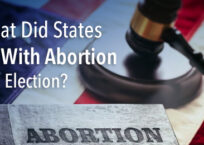
When Illinois voters make their candidate selections on the November 5, 2024, election ballot, they will also be asked their opinions on three advisory questions:
- Should all medically appropriate assisted reproductive treatments, including, but not limited to, in vitro fertilization, be covered by any health insurance plan in Illinois that provides coverage for pregnancy benefits, without limitation on the number of treatments?
- Should the Illinois Constitution be amended to create an additional 3% tax on income greater than $1,000,000 for the purpose of dedicating funds raised to property tax relief?
- Should any candidate appearing on the Illinois ballot for federal, State, or local office be subject to civil penalties if the candidate interferes or attempts to interfere with an election worker’s official duties?
The results of these three ballot questions will not change the Illinois statutes or the Illinois Constitution. The results will indicate the voting public’s opinion on the issues to lawmakers.
The three advisory questions were pushed by Illinois’ Democratic super-majority in both legislative chambers, keeping a fourth initiative concerning parental rights from being considered on the November 5th ballot.
“[SB 2412] added three advisory questions to the 2024 ballot, preventing any other citizen initiatives from being put on, as only three referendum questions are allowed at one time,” said initiative organizer Jeanne Ives, a former Illinois state representative.
As a result, Illinois voters will not be allowed in 2024 to express their opinions on whether or not parents should have a say in their children’s healthcare decisions concerning gender identity or abortion.
“The Democrats knew we were collecting petition signatures to ask the electorate to weigh in. They also know they are on the wrong side of parents, and the last thing they wanted was a ballot question that proved it,” Ives said.
So what about the three questions Illinois voters will be allowed to voice their opinions on?
Question: Should Illinois mandate Insurance Coverage for Reproductive Treatments?
The first question asks voters whether health insurance policies should be required to cover reproductive treatments, including in vitro fertilization, without limitations.
Illinois law already requires employers with over 25 employees to provide health insurance policies covering pregnancies to pay for up to six reproductive treatment egg retrievals over a lifetime. Currently, one such treatment costs approximately $50,000.
The first ballot question could effectively work to provide a basis to remove current state law exemptions for small business owners with less than 25 employees and those owners with religious beliefs concerning reproductive treatments.
That position could raise controversy among Evangelical and Catholic pro-life Illinoisans.
Dr. Al Mohler, Jr., president of the Southern Baptist Theological Seminary, suggests concerns many Evangelicals would rather ignore.
“The hard thing is that many who consider themselves to be pro-life have refused to extend their own logic to the huge moral crisis posed by IVF procedures. The blunt and unavoidable question is this: Do pro-lifers really believe that “unborn children are children?” If not, we have been lying. If we really do believe this, how do we reckon with millions of frozen children locked in an indefinite freeze and destined for destruction due to IVF procedures?
“Prevailing medical practice in the United States calls for the creation of multiple embryos and, in most cases, for the transfer of multiple embryos into the womb. Thereafter, doctors often advise (or demand) the “selective reduction” of some embryos after pregnancy is confirmed. This means the targeted killing of some embryos. The same procedure often comes with genetic screening—a form of human prenatal quality control. In many cases, medical authorities demand agreement for both selection and reduction before proceeding with treatment.”
The Catholic Church teaches that conception should occur within a wife’s body, using the egg and sperm from this wife and this husband. Depending on a couple’s medical situation, eggs and sperm can be extracted, undergo a process to improve chances of conceiving, and then be reintroduced into the woman’s body, where the conception occurs.
According to Pat McCloskey, OFM, author of the Ask a Franciscan column, the Catholic Church is not opposed to such procedures.
“However, the Catholic Church does consider immoral in vitro fertilization (IVF), the conception of a child in a petri dish—even if the egg and sperm come from the married couple desiring to have a child (homologous artificial insemination and fertilization),” he wrote May 20, 2020.
Why do Catholics oppose that particular procedure?
“The unitive and procreative dimensions of marital intercourse have been separated through the introduction of technology that threatens the dignity of the human person. An added reason is that IVF procedures usually result in several zygotes, most of which are eventually discarded.”
Thus, voters will need to decide on the November 5th ballot their position on whether reproductive treatments that bring infants into the world should be insured without limitations or exemptions by all employers, despite their religious convictions or the size of their companies.
A “Yes” vote supports requiring private insurance coverage for reproductive treatments, while a “No” vote opposes it.
Question: Should Illinois millionaires pay more income taxes?
In 2020, Illinoisans were asked whether the Illinois Constitution should be amended to remove the state’s so-called “Flat Tax” rate and replace it with a “Graduated Income Tax” rate.
Illinois voters rejected the idea, and the state continues to tax everyone at the same rate without considering income levels.
Progressives in Illinois were not content with the 2020 ballot results. They continue to seek a “progressive tax system” that requires a higher percentage of state taxes paid as a person’s income increases. In this year’s particular question wording, the concept of using those extra dollars to assist with Illinois’ high property tax rates appears, with hopes of pulling others away from preferring the Flat Tax system.
A vote “Yes” would support those making over $1,000,000 paying a higher percentage of their income in state taxes. A vote of “No” opposes higher taxes based on higher incomes.
Question: Should candidates be subject to civil penalties if they interfere in election workers’ official duties?
A candidate interfering with an election worker’s official duties could face civil penalties if Illinois voters support this referendum and state lawmakers use that support to bolster a change in state election laws.
In civil law, the losing party has to reimburse the plaintiff the amount of loss determined by the judge.
In 2024, Democrat State Representative Kevin Olickal (D-Chicago) introduced HB 4827, which calls for criminal penalties for election interference. The bill remains in the House Rules Committee pending action.
In criminal law, a person found guilty is punished by incarceration in prison, a fine, or other penalties.
A “Yes” vote would allow civil penalties for election interference, while a “No” vote would reject them.
Your opinion matters
Skipping those questions may be a voter’s first response, but that voter needs to be reminded that their opinion matters. When lawmakers ask for input from their constituents, their opinions make a difference.
While Illinois does not have the type of referendum process California has, Illinois voters can take a position on important issues and convey them to lawmakers via the ballot box.
Make a difference on November 5, 2024 – vote for president and your federal district Congress member. Vote for your state lawmakers up for election this year.
And make your opinion known on Illinois’ 2024 ballot initiatives.
Click HERE for a PDF version of this article.
Read more about IVF:
IVF and the Southern Baptist Convention (Breakpoint)
Media Distorts Southern Baptist Convention Resolution on IVF (The Washington Stand)
Liberal Media Admits IVF Has “Errors” That are “Rarely Made Public” (LifeNews)
Woman Says IVF is a ‘Cash Cow’ That Pro-Lifers Shouldn’t Defend (Live Action)
The Truth About IVF (Life Issues Institute)






















